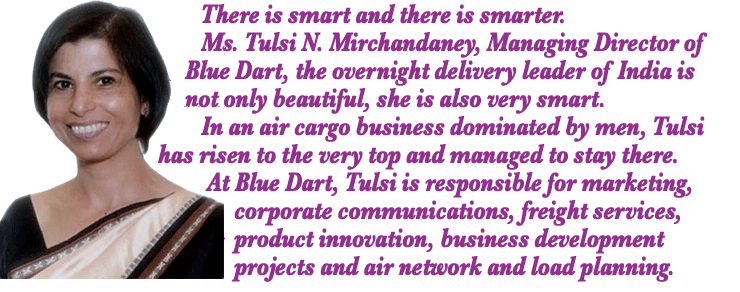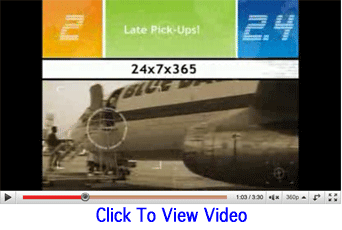

She leads the marketing research
and in-house creative team, and has been instrumental in PR and brand
development activities in the company.
Tulsi developed the industry segment module
used in-house for marketing research.
She has also recently been appointed the
Senior Advisor in Blue Dart for the roll out of the DMAIC (Six Sigma)
process within the organization.
Tulsi joined Blue Dart in 1995 to create
and market the air cargo products for the launch of India’s first
express airline, establishing agreements with key accounts and international
airlines, initiating charter services and setting up the accounting,
sales and operations systems for these services.
Tulsi has an MBA degree in International
Aviation from Concordia University, Montreal, and has presented 2 research
papers on aviation.
Here she talks up front and personal about
last year and what lies ahead in 2010.
ACNFT: What
will happen in 2010?
TNM: The
trends of the last quarter of 2009 and the initial weeks of 2010 are
cause for some optimism. India seems to have weathered the storm of
the past year fairly well, food inflation notwithstanding, and is projecting
reasonably high economic growth. Aviation turbine fuel prices, however,
continue to rise and are almost 29% higher than in the same period of
last year. Airport Infrastructure and navigation costs have also increased.
All these contribute to higher operating costs. The Indian aviation
industry has been through a rough year and I would expect the painful
lessons learned would result in a more pragmatic approach towards capacity
augmentation coming out of the downturn. As an organization, Blue Dart
Aviation has always been conservative and we shall continue to proceed
through 2010 with caution, and with sustained focus on quality service
delivery.
ACNFT: What
surprised you in 2009?
TNM: The
extent and depth of the global impact was surprising. It has probably
been the worst I have experienced in my 35 years in the industry. I
guess we can no longer hope to completely insulate ourselves from such
world events. In domestic operations such as ours, it adds another management
dimension.
 ACNFT:
How successful have your initiatives from 2009
been? ACNFT:
How successful have your initiatives from 2009
been?
TNM: Fortunately,
we recognized the signs of deceleration early and regrouped as a team
to plan our response. Every cost head was brought under the scanner,
nothing was too small to scale down. Our people rallied around and did
a great job, coming up with innovative ideas to deliver positive and
better than expected results.
ACNFT: What
are some things you are doing differently than before the financial
crises?
TNM: We
are trying to carry over the gains made last year. There is greater
awareness and therefore relentless focus on service quality deliverables
and costs. We are also reminded that, if people are aligned on strategy,
pull in the same direction and deliver on execution, chances are we
can beat the odds.
ACNFT: What
can/should everyone in air cargo do to make the industry better?
TNM: Greater
collaboration would certainly help to stimulate the industry and break
down barriers that hinder growth. We have a wealth of individual knowledge
and experience in the industry, but have somehow refrained from channeling
it into a knowledge and research base that could benefit the industry.
ACNFT: Do
you think air cargo will make any major breakthroughs in the years ahead?
TNM: The
pie is big enough for each one to find a niche to develop an individual
expertise. We live in a world where resources are no longer confined
to the points of production, and that is an opportunity for us. While
the base requirement for air transportation will continue, it is inevitable
that future models would evolve to cater to this diverse demand, models
that would entail more collaboration and consultation, and one that
will increasingly be more conscious of the environment.
ACNFT: Which
companies do you admire most?
TNM: A
number of them actually, but they all have some things in common –
they are simple business models, have high quality standards, evolve
over time and consistently deliver on their promise.
ACNFT: What
would you be doing, if not air cargo?
TNM: It’s
been a very long association and difficult to think of an alternative,
but some aspirations would be – education and research (in aviation),
giving back to the environment especially in the hilly regions of our
country, and maybe extending the weekend orchid-growing hobby to a full
time occupation.
Geoffrey
|



